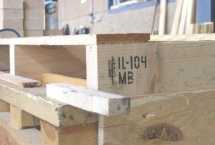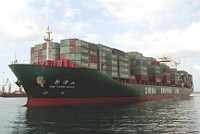Egyptian authorities rejected last week entry into Egyptian territory of Israeli goods loaded on wooden pallets at the Nitzana border crossing.
The Egyptian move, which was taken by surprise, was later understood to be due to the implementation of the ISPM 15 code which came into force in Egypt on 1st October 2005. Since it came into force all WPM must be treated and certified according to ISPM 15 code.
The Egyptian decision to reject entry,left several millions worth of Israeli goods on the Israeli side of the border. Israeli exporters had no alternative but to pull cargoes back to their warehouses for repacking and re- palletizing on ISPM 15 approved wooden pallets.
Israeli industrialists who regularly export to the Egyptian QIZ designated areas protested the Egyptian decision, arguing that no preliminary notice had been given by the Egyptian authorities.
Others complained about the continuous difficulties put up by the Egyptians and inefficiencies rendered by the Egyptian customs authorities who are slow in clearing imported goods.
The Egyptians, according to Israeli exporters, received millions of dollars from the USA to improve border crossing infrastructure and facilities but nevertheless nothing has been improved yet and the border crossing opens daily for a few hours only with very limited workforce and equipment.
Several exporters noted that the Egyptians are unable to keep pace with the increasing quantities of goods moving into Egypt.
The Nitzana border crossing is the main point where goods are exchanged between Israel and Egypt. The crossing has always been viewed as an important factor in the peace treaty between the two countries. During the first nine months of 2005, 2,602 loaded trucks crossed the border.
ISPM-15 Requirements
International Standards for Phytosanitary Measures (ISPMs) are adopted by
Contracting parties to the IPPC. ISPMs are standards, guidelines and recommendations recognized as the basis for phytosanitary measures applied by Members of the WTO under the Agreement on the Application of Sanitary and Phytosanitary Measures. Non-contracting parties to the IPPC are encouraged to observe these standards.
Recently, most of the major trading countries have notified the WTO of their intent to adopt measures in line with theInternational Standard for Phytosanitary Measures (ISPM No.15) on the Wooden Packaging Materials used for International Trade.
Penalty of the violation may end up with destruction of the packages, rejection of entry or ship back of the entire cargoes to the origin. Exporting countries have to set up programsof heat treatment or MB fumigation and the marking of thewooden packing materials used for international trade. Compliance with ISPM-15for wood packing materials allows for two treatment options:
Heat Treatment (HT): Wood packaging material should be heated in a schedule that achieves a minimum core temperature of 56÷C for a minimum of 30 minutes. The American Lumber Standards Committee administers the U.S. certification program for heat treatment.
Methyl Bromide (MB) Fumigation: The wood packaging material should be fumigated with methyl bromide. NWPCA has been tasked by the U.S. Animal and Plant Health Inspection Service to administer the fumigation program.
NOTE: ISPM 15 requirements apply to all species of coniferous (softwood) and non-coniferous (hardwood) packaging materials.




